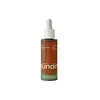What's inside
What's inside
 Key Ingredients
Key Ingredients

 Benefits
Benefits

 Concerns
Concerns

 Ingredients Side-by-side
Ingredients Side-by-side

Vitis Vinifera Seed Oil
EmollientRosa Canina Fruit Extract
AstringentCamellia Japonica Seed Oil
EmollientCorylus Avellana Seed Oil
EmollientPlukenetia Volubilis Seed Oil
EmollientC12-15 Alkyl Benzoate
AntimicrobialHippophae Rhamnoides Oil
EmollientOryza Sativa Bran Oil
EmollientMoringa Oleifera Seed Oil
EmollientNigella Sativa Seed Extract
PerfumingJasminum Grandiflorum Flower Extract
MaskingTocopherol
AntioxidantHelianthus Annuus Seed Oil
EmollientBakuchiol
AntimicrobialRosmarinus Officinalis Leaf Extract
AntimicrobialDiethylhexyl Syringylidenemalonate
Skin ProtectingBoswellia Serrata Oil
MaskingCurcuma Longa Root Oil
PerfumingCaprylic/Capric Triglyceride
MaskingBenzyl Benzoate
AntimicrobialLinalool
PerfumingEugenol
PerfumingBenzyl Alcohol
PerfumingLimonene
PerfumingVitis Vinifera Seed Oil, Rosa Canina Fruit Extract, Camellia Japonica Seed Oil, Corylus Avellana Seed Oil, Plukenetia Volubilis Seed Oil, C12-15 Alkyl Benzoate, Hippophae Rhamnoides Oil, Oryza Sativa Bran Oil, Moringa Oleifera Seed Oil, Nigella Sativa Seed Extract, Jasminum Grandiflorum Flower Extract, Tocopherol, Helianthus Annuus Seed Oil, Bakuchiol, Rosmarinus Officinalis Leaf Extract, Diethylhexyl Syringylidenemalonate, Boswellia Serrata Oil, Curcuma Longa Root Oil, Caprylic/Capric Triglyceride, Benzyl Benzoate, Linalool, Eugenol, Benzyl Alcohol, Limonene
Caprylic/Capric Triglyceride
MaskingSqualane
EmollientEmblica Officinalis Fruit Extract
Skin ConditioningRosa Canina Fruit Extract
AstringentBakuchiol
AntimicrobialHelianthus Annuus Seed Oil
EmollientPhenoxyethanol
PreservativeCetearyl Ethylhexanoate
EmollientEthylhexylglycerin
Skin ConditioningSorbitan Isostearate
EmulsifyingCrocus Sativus Flower Extract
MaskingPortulaca Pilosa Extract
Skin ConditioningSucrose Cocoate
EmulsifyingPalmitoyl Tripeptide-38
Skin ConditioningCaprylic/Capric Triglyceride, Squalane, Emblica Officinalis Fruit Extract, Rosa Canina Fruit Extract, Bakuchiol, Helianthus Annuus Seed Oil, Phenoxyethanol, Cetearyl Ethylhexanoate, Ethylhexylglycerin, Sorbitan Isostearate, Crocus Sativus Flower Extract, Portulaca Pilosa Extract, Sucrose Cocoate, Palmitoyl Tripeptide-38
Alternatives
Ingredients Explained
These ingredients are found in both products.
Ingredients higher up in an ingredient list are typically present in a larger amount.
Bakuchiol is a plant-derived antioxidant (it's vegan!). It is often called the replacement for retinol although it is not part of the same family.
It has similar effects as retinol: skin smoothing, reducing discoloration, and preventing wrinkles. It does not cause as much irritation as traditional retinoids.
Bakuchiol works by breaking down free radicals and stimulating collagen production in skin.
Combining bakuchiol with retinol will not have adverse side effects. Studies show using them will just boost the benefits. Bakuchiol is also found to help stabilize retinol.
While bakuchiol does not make the skin more sun sensitive, we recommend wearing SPF on a daily basis.
Read more about traditional retinol
Learn more about BakuchiolThis ingredient is an emollient, solvent, and texture enhancer. It is considered a skin-softener by helping the skin prevent moisture loss.
It helps thicken a product's formula and makes it easier to spread by dissolving clumping compounds.
Caprylic Triglyceride is made by combining glycerin with coconut oil, forming a clear liquid.
While there is an assumption Caprylic Triglyceride can clog pores due to it being derived from coconut oil, there is no research supporting this.
Learn more about Caprylic/Capric TriglycerideHelianthus Annuus Seed Oil is the oil derived from the seeds of a Sunflower. Sunflower seed oil is non-fragrant. It is an emollient, meaning it helps to soften the skin.
Sunflower seed oil contains many fatty acids. The fatty acids found in sunflower seeds include (from highest amount to least): linoleic acid, myristic acid, palmitic acid, stearic acid, arachidic acid, oleic acid, and linolenic acid.
These fatty acids help the skin create ceramides. Ceramides play a role in repairing the skin barrier.
Helianthus Annuus Seed Oil helps moisturize the skin. This in turn helps the skin look more rejuvenated and smoother.
Sunflowers are rich in vitamin E.
Historians believe Indigenous cultures of North America domesticated sunflowers before corn. Thus they relied on sunflower oil for a variety of uses. One such use is moisturizing skin and hair.
Sunflower seed oil may not be fungal acne safe. We recommend speaking with a professional if you have any concerns.
Learn more about Helianthus Annuus Seed OilRosa Canina Fruit Extract is from Rosehip. Rosehips are a fruit from a wild rose bush native to Eurasia and Africa.
Rosehip contains Vitamin C, Vitamin E, fatty acids and linolenic acids that hydrate skin. Having hydrated skin helps reduce the appearance of fine-lines and wrinkles.
Vitamins C and E are potent antioxidants and may help with anti-aging. The fatty acids are emollients that help soften and hydrate your skin.
Another potent vitamin found in rosehip is Vitamin A, or retinol. Retinol encourages collagen production in the skin.
Rosehip extract may help with brightening the skin. Several components, such as beta-carotene, are able to reduce pigmentation caused by sun damage.
Learn more about Rosa Canina Fruit Extract